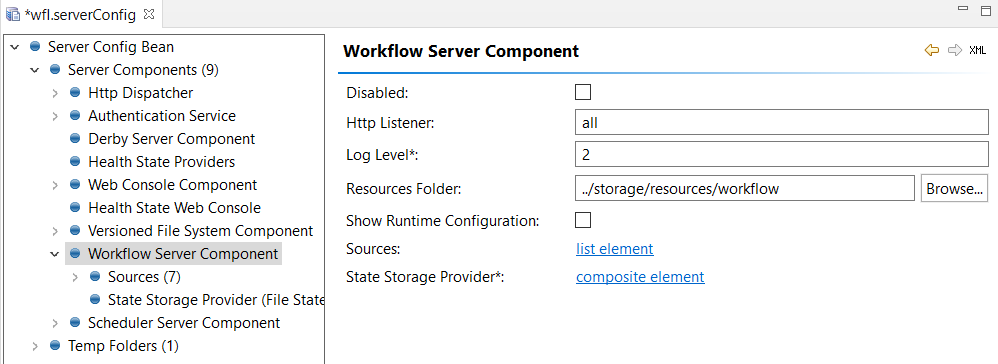Workflow Component
Defining the Workflow component adds the Workflows section to ONE Runtime Server Admin and enables running workflows on the server via the ONE Runtime Server Admin (see Workflows), HTTP Request, and OnlineCtl.
To use workflows on the server, the server configuration must contain the following definition:
<serverComponents>
...
<component logLevel="2" httpListener="all" disabled="false" showRuntimeConfiguration="false" class="com.ataccama.adt.web.WorkflowServerComponent" resourcesFolder="../storage/resources/workflow">
<sources>
<sourceConfigBean path="../storage/resources/workflow/workflows1" id="src1"/>
<sourceConfigBean path="../storage/resources/workflow/workflows2" id="src2"/>
</sources>
<stateStorageProvider class="com.ataccama.adt.runtime.state.storage.FileStateStorageProvider"/>
</component>
...
</serverComponents>A corresponding configuration in the Server Configuration Editor in ONE Desktop:

| Property | Value | Required | Description |
|---|---|---|---|
Http Listener |
all |
No |
The HTTP Dispatcher listener on which workflows can be executed via HTTP requests. See Execute Workflows for more information. |
Log Level |
2 |
Yes |
Maximum level of events that are logged into the server console. The levels are:
|
Resources Folder |
N/A |
No |
Defines a relative (to the server configuration file) or absolute path denoting the location where supporting and resource files are stored. Currently, the following files are stored:
|
Show Runtime Configuration |
N/A |
No |
Defines whether the ad hoc runtime configuration ( |
Sources |
N/A |
No |
Defines named sources used of the workflow configurations.
Each
|
State Storage Provider |
N/A |
Yes |
Defines which backend should be used for storing the workflow execution states. Currently, there are two storage provider implementations: database state storage provider and filesystem state storage provider. For more information about workflow logging, see How to Log Workflow Execution. |
Max Parallel Workflows |
0 |
No |
Defines the maximum number of simultaneously running workflow instances.
A negative number or zero ( This is the same as multiplicity for a workflow, but it is instead applied globally for all workflows running on the server. |
Filesystem state storage provider
Stores information about the workflow and its task states to a .wis file.
<component class="com.ataccama.adt.web.WorkflowServerComponent">
...
<stateStorageProvider class="com.ataccama.adt.runtime.state.storage.FileStateStorageProvider"/>
...
</component>Database state storage provider
Stores information about the workflow and its task states to the database. The database state storage provider is configured with the following attributes:
-
dataSource - Name of the connection to the database where logs will be stored. The connection definition must be present in the Runtime Configuration.
-
prefix - Prefix added to the names of database persistence tables. Default value:
WISP_.
<component class="com.ataccama.adt.web.WorkflowServerComponent">
...
<stateStorageProvider class="com.ataccama.adt.runtime.state.storage.DbStateStorageProvider">
<dataSource>db-postgres</dataSource>
</stateStorageProvider>
...
</component>The following databases can be configured to use as database state storage providers for the Workflow component: Oracle, PostgreSQL, Microsoft SQL Server. For the recommended and supported versions, see Supported Third-Party Components.
For non-production purposes, you can also use Apache Derby (recommended versions: 10.14.2.0, 10.10.2.0).
Was this page useful?
